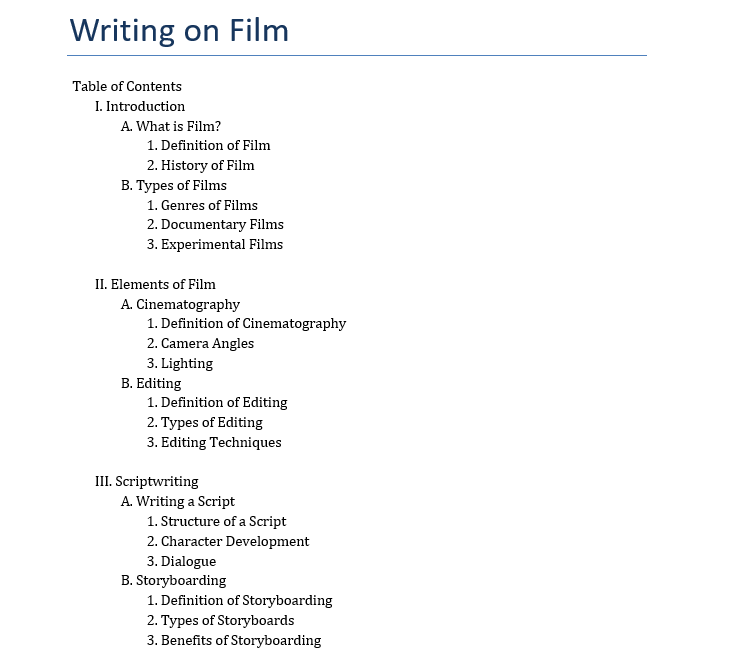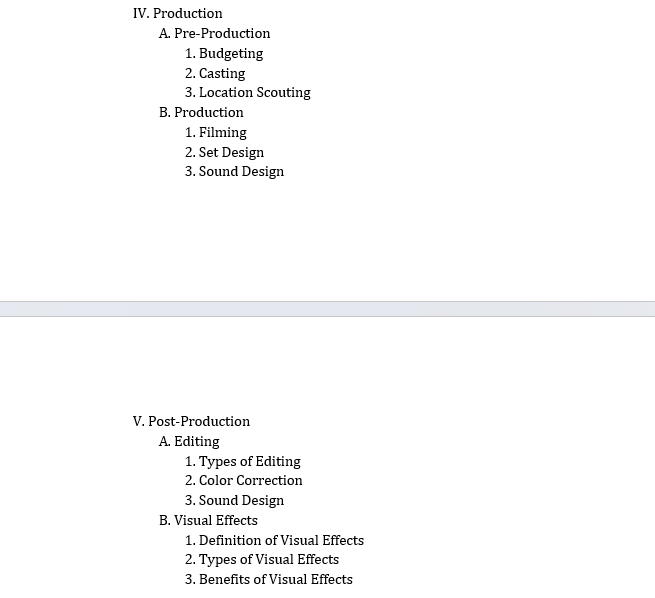AI as More Than a Search Engine
Using AI to Refine Your Searches and Ideas
Summary
You can use AI to make connections beyond what search engines typically do
See examples of how I used ChatGPT to plan mini units for aWriting on Film and TV course
Save yourself time by allowing ChatGPT to do the heavy lifting for you
This was tested using ChatGPT 4 (no plugins)
What Was My Goal?
Next year I will be teaching Writing on Film which serves as an English elective, and as far as I know there’s no existing curriculum to draw upon which means I get a lot of freedom in what I’d like to teach. It also means that I will have to create my content from scratch, but thankfully I have all sorts of AI tools to help me with the process. Before we get into the searching portion of the post, here’s a screenshot of a basic curriculum I generated using ChatGPT
With that out of the way, one of the main uses for ChatGPT with regards to this class is to help me decine on what films or episodes to show. The Good Place is one of my all time favorite shows and if I could do a course just on that show I would jump on the opportunity. Until that day, I figured I would use ChatGPT to pick out some episodes to tell a somewhat cohesive narrative.
Initially ChatGPT gave me a list with detailed explanations for every episode choice, but in the interest of brevity here is condensed version:
"Everything is Fine" (Season 1, Episode 1)
"Michael's Gambit" (Season 1, Episode 13)
"Dance Dance Resolution" (Season 2, Episode 2)
"The Trolley Problem" (Season 2, Episode 6)
"Jeremy Bearimy" (Season 3, Episode 5)
"The Answer" (Season 4, Episode 9)
"Whenever You're Ready" (Season 4, Episode 13)
The selected episodes reflect key moments in the philosophical and ethical evolution of the characters and the narrative itself. They cover the introduction of the show's unique moral framework, major plot twists that challenge the characters' and viewers' understanding of ethics, and the ultimate resolution of the characters' ethical journeys. This combination of episodes provides a holistic view of the moral and ethical themes of "The Good Place," and will allow for a diverse range of discussions about ethical theories, moral dilemmas, and the question of what it means to be a good person.
Other List Combinations
Sure, I found a few movies that might be suitable for your high school class discussion on juvenile justice, particularly as it pertains to young people of color. All of these films are unrated or have a PG-13 rating.
"1st Strike" (2016) - This movie is about a teenager named Juan who lives in a gang-infested LA barrio. When his Uncle Manny invites him out on a joy ride, the situation goes bad and Juan is accused of a crime he did not commit. This film could foster discussions about community, family loyalty, and the criminal justice system's treatment of youth, particularly Latino youth12.
"Prison Kids: A Crime Against America's Children" (2015) - This is a documentary that offers an in-depth look at the country's broken juvenile justice system. It examines how the United States incarcerates children at a higher rate than any other developed nation. This documentary could be useful for starting a conversation about the larger systemic issues in the juvenile justice system13.
"Circles" (2018) - This film appears to be about restorative justice, which could provide an opportunity to discuss alternative justice systems and practices. However, I wasn't able to find a detailed plot summary or age rating during the search. It would be best to review this film before showing it to your class to make sure it's appropriate1.
Movies About Aliens that Serve as Social Commentary
I would recommend movies like "District 9", "The Day the Earth Stood Still", and "They Live" as they are well-known for using alien narratives to address social issues. However, if you would like a more comprehensive list or details about these movies, I would need more time to provide that information.Movies Considered Faithful to Their Source Material:
Schindler's List (1993) - Based on the true story of Oskar Schindler who managed to save about 1100 Jews from being gassed at the Auschwitz concentration camp during World War II.
The Pianist (2002) - This film is a biographical drama about the life of Polish pianist and composer Władysław Szpilman during the Holocaust.
12 Years a Slave (2013) - This film is based on the 1853 autobiography "Twelve Years a Slave" by Solomon Northup, a free black man who was kidnapped in Washington, D.C., in 1841 and sold into slavery.
Spotlight (2015) - The film follows The Boston Globe's "Spotlight" team, the oldest continuously operating newspaper investigative journalist unit in the United States, and its investigation into cases of widespread and systemic child sex abuse in the Boston area by numerous Roman Catholic priests.
Movies That Take More Liberties with Their Source Material:
A Beautiful Mind (2001) - While the film does portray the life of John Nash, a Nobel Laureate in Economics, it takes significant liberties with the details of his life and the nature of his work.
The Social Network (2010) - This film tells the story of the founding of Facebook and the resulting lawsuits. However, it has been criticized for its lack of accuracy.
Argo (2012) - This film is based on the "Canadian Caper" during the Iran hostage crisis. However, it was criticized for minimizing the role of the Canadian embassy in the rescue.
The Imitation Game (2014) - This film is about British mathematician, logician, cryptanalyst and pioneering computer scientist Alan Turing who was a key figure in cracking Nazi Germany's naval Enigma code which helped the Allies win the Second World War. The film, however, has been criticized for its inaccurate portrayal of historical events and Turing's character.
Conclusion
Be specific with your prompts, explain what you’re looking for and the format in which you’d like it
Explain themes or the purpose you have for your movies





